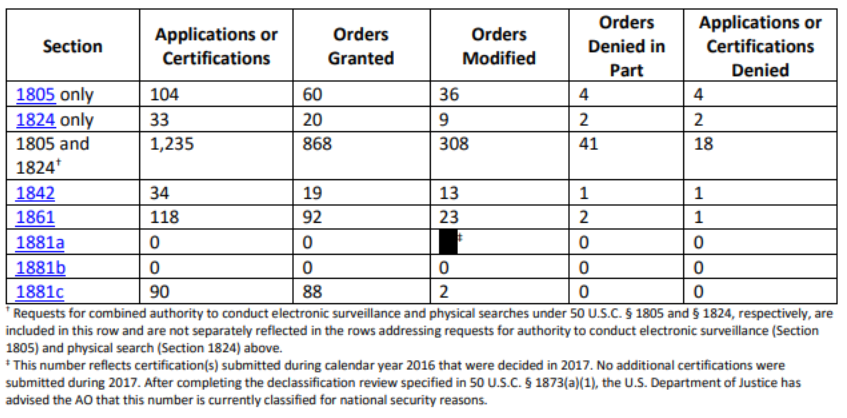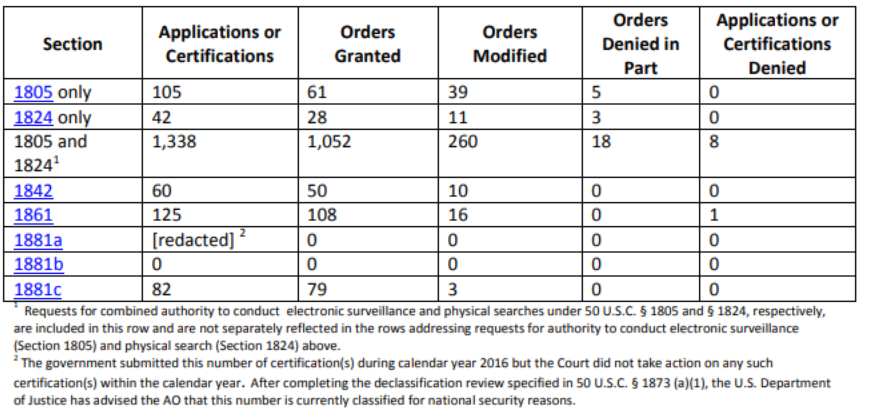The FISA Court Accepted 9% Fewer Combined Applications Last Year
The FISA Court released its second annual report on approval rates today (the obligation to produce such a report dates to 2015 and it produced a partial report covering that year). It shows that the FISA Court rejected and modified far more joint applications last year than the prior year, with just a 70% complete approval last year as compared to a 79% complete approval the year before, as reflected in this table.
Approval rates for combined orders, 2017 versus 2016
These are for combined orders, meaning the government wants to collect both data in motion and (collect stored data and/or conduct a physical search). Modifications usually mean additional reporting and/or minimization procedures (meaning the government had to treat the collected data with additional care). An order denied in part might prohibit the collection on one of the selectors submitted to the court, but not a bunch of other ones. An order denied in full would represent a complete rejection of a preliminary order (these won’t show up on DOJ’s numbers because those are fluffed to look good).
There are several things that might explain these numbers. First, the rising modification number might mean the government is using new techniques that present additional privacy concerns — accessing cell phones are a likely one, especially given the Riley SCOTUS precedent. Hacking is another technique that might pose specific privacy concerns, or accessing entire servers.
The denied in part number likely stems from the government asking to surveil selectors that are more attenuated from the actual target. The rejections might reflect individual selectors for which the FISC didn’t agree the government had shown probable cause the selector was being used by an agent of a foreign power.
Most alarming, though, is the rise in outright rejections, from 8 to 18. This suggests the government is trying to wiretap and otherwise surveil people as agents of a foreign power that the FISC doesn’t agree are such.
And all this happened at a time when the government submitted fewer overall combined applications. Remember, the government can and sometimes does take its wiretapping elsewhere if the FISC rejects a practice. I’ll do a follow-up post describing why this report may reflect that has happened.
Here’s this year’s report, covering 2017, and last year’s report, covering 2016. This post provides background on the requirement and how these reports differ from the required DOJ report. The full tables from the two reports are below. They show an increased rate of modifications for 1861, which are 215 orders, as well.





![[Photo: Annie Spratt via Unsplash]](https://www.emptywheel.net/wp-content/uploads/2017/08/Books_AnnieSpratt-Unsplash_mod1-80x80.jpg)

Would the rejection numbers reflect a decrease in the quality of personnel involved? I don’t have a sense of how the brain drain in many parts of the government may or may not have a parallel in this community.
When a local police officer shoots an unarmed person, the language used by the officer is “I feared for my life,” and that’s usually enough to get the courts to let the officer off (see Tennessee v Garner and Graham v Connor). At the federal level, when the government goes to court and says “National Security!” they expect to get their way (not unreasonably; see Korematsu v US). I suspect that the FISC is getting tired of cries of “National security!” being trotted out for all manner of things that are, upon careful consideration, no such thing.
Which is a good sign, given what’s happening elsewhere in DC these days. See today’s travel ban arguments at SCOTUS, where Karen Korematsu sat in the gallery looking on, as described by Charlie Pierce:
Oh come on emptywheel! They’re going around the court’s jurisdiction. Hell, the NSA is probably spying on the FISA court too :)
If you haven’t already, I strongly suggest you read this document. The prevailing theme is reckless noncompliance.
https://www.dni.gov/files/documents/icotr/51117/2016_Cert_FISC_Memo_Opin_Order_Apr_2017.pdf
There’s just so many holes in the whole infrastructure, who knows who has access. Ed Walker has been ranting about neoliberalism for the past few days, maybe he can do a post about why the hell Amazon is hosting the NSA’s dirt? I don’t want to hear anything about saving money either.
https://analyticsweek.com/content/nsa-to-crunch-big-data-in-aws-c2s/
Soldalinsky
Did you think to check whether I was the first person to read the document you linked, and one of the very few people who has done so competently?
No. There’s so much going on and I can barely keep up with current events. I’ve been lurking around here for about a month which is the main reason I missed it. Without knowledge of your previous post, this one doesn’t make much sense.
*I still haven’t quite worked out the decorum here, so please don’t interpret my posts as flippant.
Fair enough–and sorry I was so short. Almost all the reporting on that opinion was utterly incompetent, and I spend a lot of time correcting people who claim to be experts on FISA who have only read that one opinion. Here was my first post on that opinion, though there have been a slew of others.
“decorum” seems an odd term to resort to in a supplication for failing to have done an objectively responsible thing (like fact-checking, including for relevant antecedents) before posting a reader comment that heads madly off in all directions, particularly when commenting on a blog hosted by someone describing herself on Twitter as “Legendary potty mouth”.
* * *
I won’t repeat here the long admittedly pedantic anecdote on reporting obligations I posted in commenting to an Emptywheel piece on this subject some years ago. Plus I both approve of this subject being covered as closely as possible by someone as careful and responsible as our host, and look forward to the promised follow-up on ‘resorts elsewhere’.
But I do add 3 points:
1. An 80% rate associated with one year followed by a 70% associate with the next does not to me seem particularly flag-worthy, especially, as our host notes there are only 2 years in the entire database.
2. The provisions of the FIS Act 1978 haven’t merely been renewed, but have actually been materially altered, FOUR TIMES (and all between October 26, 2001 and June 3, 2015, both dates inclusive).
Some of the changes made in each instance imposed barriers – at least barriers; actually, I think something approaching practical opacity – in attempting meaningful comparison among the 5 regulatory regimes.
3. Even under the two regimes of which I have some little personal experience or at all reliable hearsay, I’m aware of variations on reporting policies.
Note, AOT, that although the FISA was signed into law by a POTUS of one party, within less than 3 years he would be displaced by POTUSi of the other party, who were in for the next TWELVE.
That is. whatever ambit Congress and the administration might have shared for reporting when the law was first promulgated, the policies interpreting that ambit really didn’t begin to kick in until after POTUSi of the party, many of whose members broadly opposed it, were in office.
Recall that the controlling opinion of the court in the so-called “Keith” case 1972 was that the administration’s power to authorize strictly foreign surveillance was completely unfettered – a state of affairs Republican administrations, at least, have generally favored over the entire period since WWII, and that it was the combination of the Keith case opinion, the Watergate affair, and the Church Commission, all happening over a fairly compressed time period, that brought about the push for what became the FISA.
It was the two Reagan and one GHW Bush administrations that ended up doing the ‘pioneering’ work on those policies (I think it’s also worth noting that GHWB had been CIA director for a time, it was widely understood – at least before Woodward set to trying to re-write the history of the CIA of that time – that as veep, GHWB was far more hands on than Reagan in the intersection of U.S. spying and foreign policy, and that Addington entered federal public service as assistant general counsel to the CIA in 1984 and Libby entered in 1981 carrying Wolfowitz’ bags at State.
If I seem to imply a snake clusterball, I do: those 3 Republican administrations featured first ‘advice’ from, and eventually actual participation of, one Dick Cheney (first in as an unusually well-connected-and-favored House rep, then as Secretary of Defense), as well as his eventually favored pretties Addington and Libby, in their common areas of interest: CIA, State, and Defense.
So – imagine now the metamorphosis, notable even from some distance, that occurred over 1981-1993, not just generally in the reporting policies of the federal government, but in the areas entrusted with its most confidential and sensitive information.
My point, again, is that it’s at best extremely difficult to draw meaningful information, let alone any carrying lessons, from FISA reporting statistics even within a given regime.
(Now I fear that even as I try to avoid pedantry in this area, it still creeps in.)
Or maybe the problem is that the requests have been getting so inappropriate? Or it’s just pushing back by the deep state? (I through that in for the paranoids; the increase in rejections is too small).
Or maybe the fewer FISA warrants are needed because Peter Thiel, owner of natsec contractor Planatir, is providing the NSA et al with more data obtained from Facebook (where he serves as Zuck’s mentor). (Yes; this one thing I’m crazy paranoid about — that and that Donald got the key few votes for the Electoral College win thanks to domestic election machine hacking. But I swear those are the only two things I’m paranoid about.)
Would love to see a breakdown between NSA vs FBI applications. Probably not available at this point in time.
No crumbs leading to SHRUMPS! pushback on Derp, Derp State?